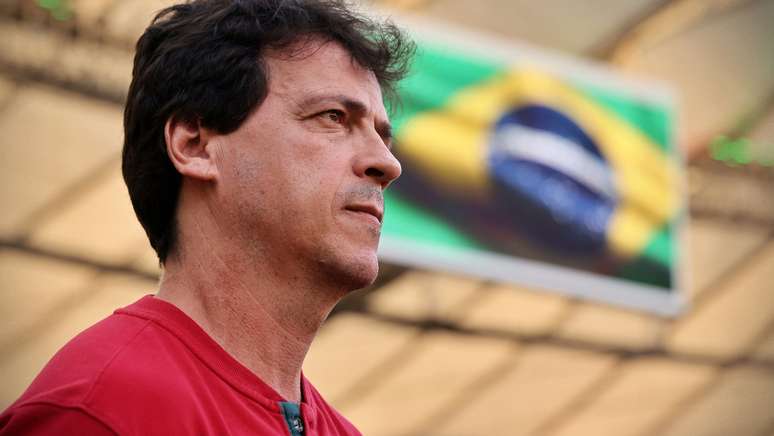The coach leaves Fluminense warmed by eternal Italian gratitude, despite a bad season after the most important title in the club’s history
Fernando Diniz is not just a football coach. Furthermore, Fernando Diniz is an idea. One of the rare professional cases that gives its name to a doctrine. Like the universal legends of Guardiola and Bielsa, among lovers and detractors, he was acclaimed for his “dynism” and the transgressive way in which his teams played.
Fluminense’s dismissal, made official in the early afternoon of this Monday, after a sequence of eight games without a win and with the team sunk to the bottom of the Brazilian championship, puts an end to his career as the most successful coach, marked by the victory of the most important title in the history of Tricolor -, but it does not end with the seed planted by Diniz.
There are those who say that the basis of dynamism is the exchange of passes, like the one that involved the powerful Manchester City for more than two minutes in the final of the Club World Cup. For others, the gaming philosophy starts from the appositional system, in which players move freely in search of spaces on the pitch. The coach’s model can still be defined by his unconditional willingness to take risks, to the point of crossing balls inside his own area and resorting to exiting with the goalkeeper’s feet.
But, according to Diniz, its premise is much simpler than any theory. Dynicism is based on human relationships. In creating deep bonds with athletes, convincing them that they can be much better than they actually are and that, to do so, they must be willing to take risks and save the dreamy kids they once were.
This was how he saved John Kennedy, hero of the Libertadores victory, after hearing from the coach, still on the edge of the Maracanã lawn, that he would come in to score the title-winning goal. No sooner said than done. Diniz tries to see the player first and foremost as a person. And understanding human beings is half the battle to decipher and seduce them.
Deciphering what each individual does best and allowing oneself to be seduced by the instinctive desire to play good football is a virtue inseparable from dynamism. Therefore, trying to measure one’s success based on the percentage of ball possession or the number of passes exchanged is still reductionism, since it ignores the human and variable dimension of the process.
Breaking down the dynamism means recognizing that your mentor is human too. Imperfect, sanguine, fickle. More than the mistakes made along the way, such as the unjustifiable exposure of Tchê Tchê at the time of San Paolo or the relapse of John Kennedy at Fluminense, expelled this year for indiscipline, Diniz seems, finally, to have realized his baggage of liabilities personal.
He has never been the same since the dismissal of the interim command of the Brazilian team at the beginning of the year. I was hoping to have more time and understanding of CBF. Instead, the only thing he received was the long-awaited confirmation from his critics that he could not convince the country’s biggest stars to follow his commands.
An injustice that Diniz, averse to arbitrary and hasty labels, struggled to digest. In daily life, Fluminense, especially after the negative results, has become increasingly reactive. He confused fair questions about the team’s performance with gratuitous persecution and harassment. He showed signs of physical and mental exhaustion, probably the result of the tiredness imposed by the months of double shifts in the national team.
With the convictions that mark his path since his first steps as a coach in the small Votoraty, Fernando Diniz reached the top of America and, in the following semester, the last place in the Brazilian championship standings. It couldn’t be different. Dynicism is an ideology made up of extremes. Some love it, some hate it. Either it’s a spectacle or it’s embarrassing. Either you win or you lose.
Ironic, given that, as an athlete or coach, Diniz has always opposed extremist determinism. For him, football shouldn’t be a pendulum from heaven to hell. Mistakes do not define the quality of an athlete. Victories do not shape the character of champions. Likewise, defeats do not symbolize the perpetual karma of the losers.
The fight against resultism, after all, is one of the greatest legacies of dynamism. There is all the charm of the unpredictability of the game and the human nuances to be explored and appreciated in football. So Diniz is happy and disappointed. He made you smile and he made you cry. But, despite the bad moment of this season, he greets Fluminense as a winner, with the eternal gratitude of the tricolors, now convinced that defeats do not put an end to ideas.
Source: Terra
Rose James is a Gossipify movie and series reviewer known for her in-depth analysis and unique perspective on the latest releases. With a background in film studies, she provides engaging and informative reviews, and keeps readers up to date with industry trends and emerging talents.






